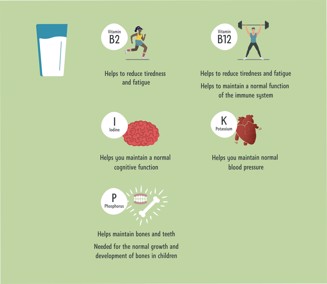
Milk contains different nutrients that are among the many nutrients that your body needs. Take a closer look at the milk benefits and the nutrients in milk: calcium, protein, vitamin B2, vitamin B12, potassium, phosphorus and iodine.
If you are Googling 'Is milk is good for you' or 'what are the milk benefits', you will find many different answers. Lots of food scientists, health professionals and food influencers are providing content online on benefits of milk, cheese, yogurt etc. and there are many different opinions on how dairy products benefits you. Some will say milk is bad for you, while others will say milk is good for you. Naturally, it is easy to get confused or misled.
No one can argue that milk contains different nutrients that are among the many nutrients that your body needs on a daily basis. And if you look to most national dietary guidelines across the world, you’ll find the clear answer that dairy can be included in a healthy, balanced diet. The recommendations are made by nutritional experts to guide you on what to eat to help you stay healthy, how to get the nutrients you need, how to avoid becoming overweight and getting lifestyle diseases.
Milk benefits served in one glass
Dairy provides a variety of taste and textures that fit well into numerous meals and eating occasions. However, milk also provides an easy access to important nutrients that are recommended on a daily basis.
Just one glass of milk (200 ml, 1.5% fat) will give you the following nutrients:
- Protein: 14% needed daily intake
- Calcium: 31% needed daily intake
- Vitamin B12: 36% needed daily intake
- Vitamin B2 (riboflavin): 26% needed daily intake
- Iodine: 16% needed daily intake
- Phosphorous: 28% needed daily intake
- Potassium: 16% needed daily intake
The specific recommendations on daily intake of milk vary a little from country to country. The daily intake used on this webpage are based on national dietary guidelines in Denmark, where Arla is legally based. Please seek your national health authorities for specific recommendations on daily intake.
Get a full overview of the nutrients in milk and how they benefit your body.

Milk benefits - a source of protein and calcium
Most of the nutrients that are present in milk are among those nutrients that are necessary for your body. Having a glass of milk or a bowl of yogurt on a daily basis is a very easy way to obtain a significant amount of protein and calcium and at the same time get a number of other nutritional benefits. And it doesn't take a lot of preparation or cooking.
There are many ways to make sure that you get the benefits of dairy in a healthy and balanced diet. If you don’t like to drink milk from a glass, simply add milk to your coffee, pour it on your cereal, put cheese in your sandwich or grab a pot of high-protein skyr or a drinking yogurt instead. If you don’t have access to fresh milk, you can get the same nutrients from quality milk powder products.

Milk does, however, not contain all the nutrients that you need. You will have to eat a balanced diet with various components to get all the nutrients you need – for example you will need other food sources than milk to get iron, fibres or vitamin c.
If you are lactose intolerant, you don’t have to miss out on the benefits of dairy. Lactose-free dairy products also provide calcium, protein and all the other milk benefits. Read more about lactose free dairy products here.
But is dairy really necessary? Or could you get the same nutritional package from non-dairy milk alternatives such as soy drinks, oat drinks, rice drinks or almond drinks? It's a hot topic that you can read about in this article on plant based milk alternatives.
What do the dietary guidelines say about milk benefits?
National and international health authorities agree that milk and dairy can be part of a healthy, balanced diet. Dairy is therefore recommended by many national dietary guidelines across the world. These recommendations have been made to guide you on what to eat to help you stay healthy, how to get the nutrients you need, how to avoid overweight and lifestyle diseases
However, the national dietary guidelines vary a little from country to country when it comes to the exact amount. Some countries recommend at least one serving of milk or other dairy products daily, while others recommend up to three servings per day. It is often recommend that you choose low-fat dairy product if you enjoy these on a daily basis, while full fat products should be enjoyed in smaller amounts.
But can you drink too much milk? Get the answer here
If you want to know more about the benefits of dairy and how much milk you should drink if you are a teenager, pregnant or older, go to your national health authorities for specific advice.
If you want to compare dietary guidelines, the UN’s food and agricultural organisation FAO has made an overview of different national dietary guideline from around the world
Can dairy boost your immune system?
People’s interest in nutrition and diet in relation to immunity has increased, and with this interest there is also a risk of increasing confusion and misconceptions.
Let’s just be clear: No single food can protect you from getting ill or guarantee that you will be healthy throughout life. Nevertheless, keeping your diet balanced and healthy is important to support your immune function and a mix of many nutrients will influence your body’s ability to fight infection.
The immune system is a complex network of cells and chemical compounds that help defend the body against infections. A number of different nutrients are involved in supporting our immune systems to work normally so that we can deal with infections.
Milk and some dairy products contain vitamin B12 and zinc that are known to benefit the normal function of the immune system. You'll get vitamin B12 from milk and both vitamin B12 and zinc from hard/semi-hard yellow cheese.
Get more facts about the nutritional value in different types of cheeses
This fact doesn’t mean that dairy will keep you free of illness, but only that these nutrients are beneficial to your immune function. These nutrients can of course also be obtained from other food sources and supplements.
It’s important to remember that no source of nutrients in itself is enough to stay healthy and that no food is slimming or fattening, good or bad for you. Your personal health doesn’t depend on a single food product, but on the amount and combination of foods you eat and your individual needs at different stages in life. And of course a lot of other factors, such as exercise, sleep, smoking, alcohol, pollution etc.

The truth about dairy
There are lots of scientific studies that conclude that there are possible health benefits of milk. And there are some that point to possible negative effects. Some will even claim that dairy can have an adverse effect on certain health issues.
When new research is presented in the media, it’s important to remember that it is one of thousands of studies and that one particular study needs to be seen as one perspective in a very big pool of scientific evidence.
In other words, it can be very difficult for you to find the ultimate truth about milk benefits. So how do you know if milk is good or bad for you? How can anyone know what are the real facts about dairy and what are only myths about dairy?
The best you can do is listen to the recommendations from your national food authority who work to give you the best advice on health and nutrition in the interest of public health. Many countries’ food authorities recommend dairy in a healthy and balanced diet.
Your national food authority takes all the existing science-based evidence into account when they define their dietary guidelines. In Europe, this also goes for the European Food Safety Authority (EFSA) who provides independent scientific advice to the decision makers who regulate food safety in the EU and in the member states.
In Arla we monitor the development health science. We rely on food authorities to conclude on the results and we support their dietary guidelines.
Limits to what Arla can say about dairy and health
For Arla as a European food company there are many legal restrictions in the EU to what we are allowed to say about the nutrition and health benefits of milk and other food products.
These restrictions are basically there to protect you from being misinformed and misled by nutrition and health claims without clear, accurate and science-based evidence.
These limitations do not apply to health bloggers, nutritionist or anti-dairy groups who can basically say what they want about dairy, food and health without being able to document their statements with any peer reviewed scientific evidence.
So no matter how much we would like to, we at Arla are not allowed to answer your question “Is milk healthy?”. However, there are facts about milk we are allowed to talk about, for example that milk is a source of protein, and that protein contributes to the growth and maintenance of muscle mass. Or that milk is a source of calcium, and that calcium contributes to the development of bones in children and maintenance of normal bones and teeth troughout life.
These are some of the dairy facts that have been scientifically documented and are recognized and promoted by the EU and the United Nations’ Food and Agriculture Organisation (FAO).
